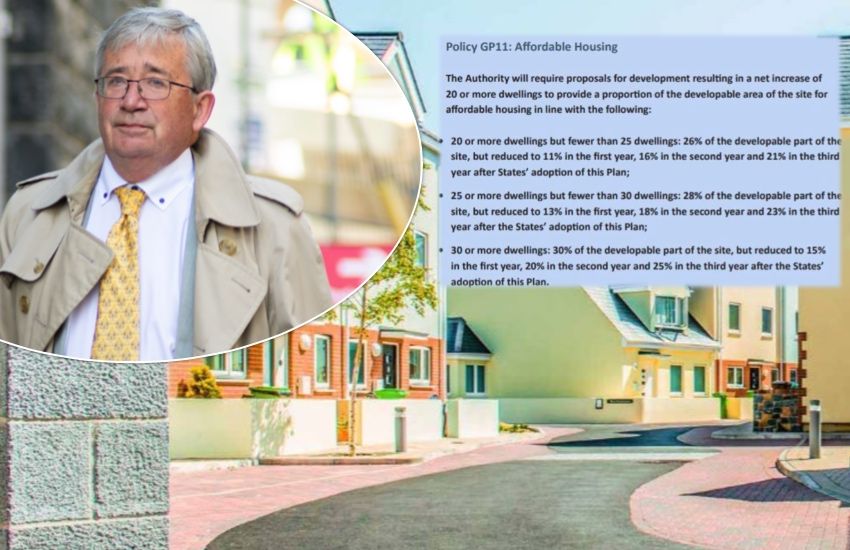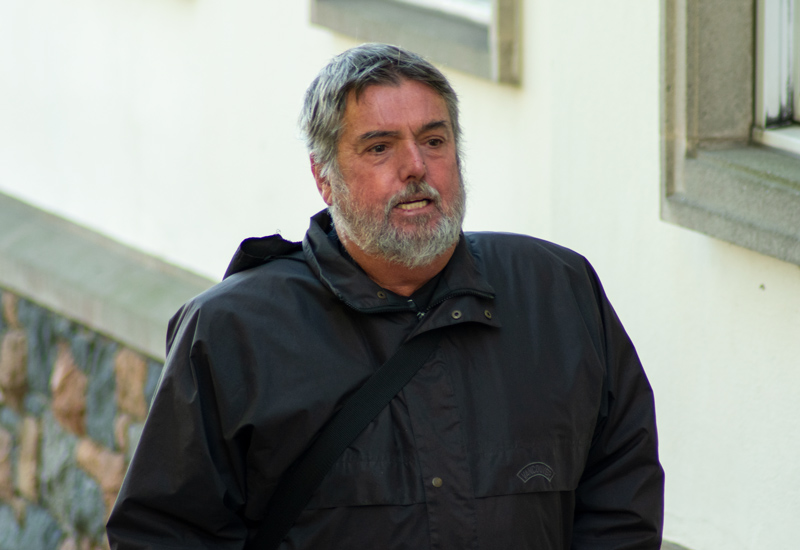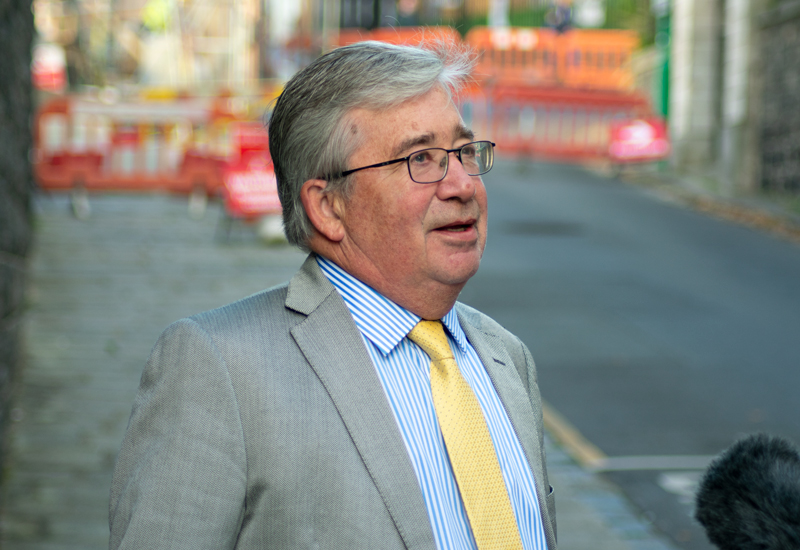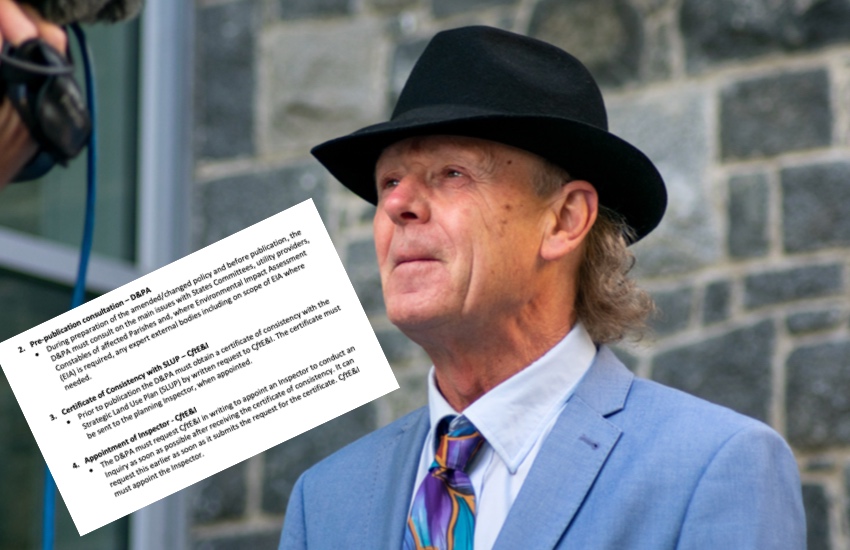


Deputy John Dyke is determined that a controversial planning policy on affordable housing - known as GP11 - will "go back to the States sooner rather than later" because he says changing it is essential "if we want to help get our youngsters into houses".
Deputy Dyke is a member of the Development & Planning Authority. He has been tasked with researching potential amendments to GP11 and ways of making the Island Development Plan easier to change generally.
The Island Development Plan was approved by the States in 2016. It guides all development and land planning in Guernsey. It includes policy GP11, which requires developments of 20 housing units or more to include a percentage of social or affordable housing.
The threshold for GP11 to apply was originally proposed to be only five housing units but was set at 20 by the States following a successful amendment from Deputy Peter Roffey. Since October 2020, he has been the President of the Committee for Employment & Social Security, which is responsible for social and affordable housing.

Pictured: Deputy Peter Roffey said: "We’re going to need a lot of social housing going forward."
Since being elected to the States in October 2020, Deputy Dyke has consistently argued that GP11 is holding back housing developments.
Last night, he told Express that it is now "a huge deterrent to larger developments" and wants to see it re-debated by deputies soon.
“Yes, [GP11] must go back to the States sooner rather than later. GP11 is a huge deterrent to larger developments. If we want to help get our youngsters into houses – and we do – we need to change GP11,” said Deputy Dyke.
The Development & Planning Authority has already informed the States' Assembly that Deputy Dyke is looking at how to streamline the process for changing the Island Development Plan, without which amending GP11 or other policies could take months if not years.
“The D&PA is looking to see if this process can be shortened,” said Deputy Victoria Oliver, President of the Authority, on 28 January this year.
“We currently have a draft document suggesting some changes, but this needs to be reviewed by St. James Chambers [the Law Officers] to make sure that any amended process would still be transparent and fair, and brought before the Committee.
"In turn, when finalised, this might help as part of any evidence-based proposals to amend GP11 if this policy is found to require changing and could potentially help in other policy areas.”

Pictured: Deputy John Dyke said: "GP11 is a huge deterrent to larger developments."
Deputy Lester Queripel recently submitted a series of Rule 14 questions on GP11. He received the latest set of replies yesterday.
Deputy Queripel asked for clarification on how costly and time consuming it would be to change the Island Development Plan.
Deputy Oliver replied by laying out 12 steps required, but said it would be difficult to state a timescale or cost as it would depend on which policies deputies wanted to change.
Deputy Queripel also asked when Deputy Dyke will conclude his research and the next steps once he has concluded it.
"Deputy Dyke will conclude his research shortly," said Deputy Oliver.
"This will then be considered by the Authority as a priority. Pending that consideration, it is premature to speculate on any further steps which the Committee might decide to take. If anything were to change, then it would have to come to the States."
Deputy Dyke told Express: “We’ve got a Development & Planning Authority meeting at the end of next week and we should know more then.
“There are two things we’re looking at possibly changing – well, there’s a queue of things we’d like to look at – but the two things are:
“First, we’re looking at ways to make it easier for the States to make changes to the Island Development Plan. The States would still be involved, but it would be about reducing what is currently about a 15-stage process involving a planning inspector and so on.
“Second, there’s GP11. There are various things you could do. You could scrap it or suspend it or change definitions or change percentages when GP11 applies.”

Pictured: Deputy Queripel claims the 12 steps required to change the Island Development Plan could cost the taxpayer up to £200,000.
The claim that GP11 has stalled housing developments continues to be strongly refuted by the Committee for Employment & Social Security and the Guernsey Housing Association.
Deputy Roffey said the large waiting lists for social housing and partial ownership indicate the need for GP11.
“The idea that removing GP11 is the panacea to addressing the current housing supply problems is simply not true,” said Deputy Roffey.
“GP11 was written so that it does not place a disproportionate burden on developers whilst also securing land for affordable housing.
"Where GP11 would render a development unviable, then adjustments can be made, so as not to discourage development.
“I would not welcome any rolling back of the policy.”
However, Deputy Roffey said there is one amendment he would like to see to GP11.
“There’s one change I would welcome - expecting a contribution from developments under 20 to social housing developments elsewhere," he said.
This idea was debated by the previous States' Assembly. It was approved in principle but has not been put into effect. It would require developers to make a cash contribution to alternative social housing developments.
Claims about social housing policy GP11 are "complete moonshine"
Flexible GP11 "a mockery of policy - if developers can get around it"
Comments
Comments on this story express the views of the commentator only, not Bailiwick Publishing. We are unable to guarantee the accuracy of any of those comments.